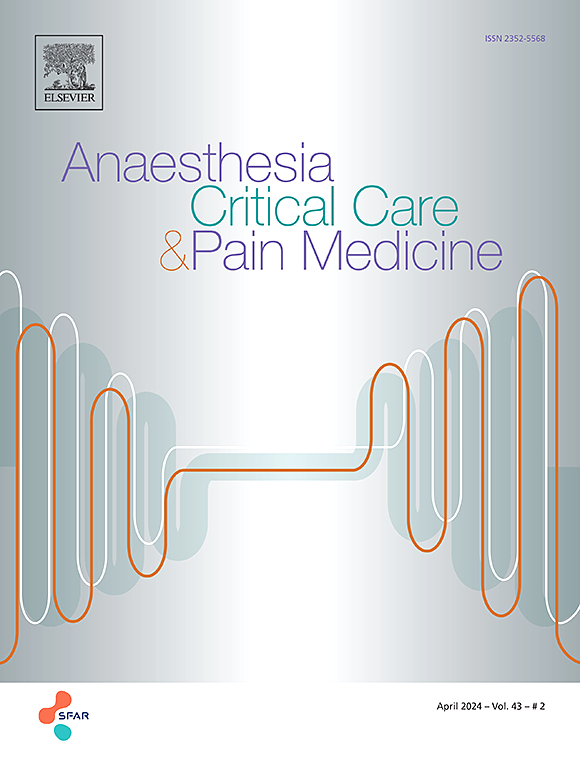Nonsteroidal anti-inflammatory drug use and acute kidney injury in nephrectomies: A retrospective propensity score-matched cohort study
IF 4.7
3区 医学
Q1 ANESTHESIOLOGY
引用次数: 0
Abstract
Introduction
Nonsteroidal anti-inflammatory drugs (NSAID) are analgesic and spare opioids, but it remains unclear whether perioperative NSAID use worsens renal function after nephrectomy. We therefore tested the hypothesis that perioperative use of NSAID is associated with acute kidney injury (AKI) after nephrectomy surgery.
Methods
This retrospective cohort study included patients ≥18 years old who had partial or radical nephrectomies. Patients who were given intravenous NSAIDs for postoperative analgesia were defined as one group, whereas reference patients did not use any NSAIDs. The primary outcome was the occurrence of postoperative acute kidney injury (AKI), as defined by the Kidney Disease: Improving Global Outcomes criteria. Secondary outcomes included AKI stage, NSAID-related side effects, postoperative hemoglobin, cumulative opioid consumption, and duration of hospitalization.
Results
Among 3,359 eligible nephrectomy patients, 78% (2,614) were given NSAIDs. We propensity-score-matched 739 pairs of patients who were or were not given NSAIDs. Patients in the NSAID group did not have more AKI (27.6%vs. 27.9%, HR 0.98 95% CI (0.80–1.19), P = 0.90), nor were their AKI stages worse [OR 0.99 (0.79–1.24), P = 0.91]. No significant differences were detected in NSAID-related side effects [OR 1.50 (0.42, 5.32), P = 0.53]. However, NSAID treatment was associated with shorter postoperative hospitalization: [5 [4,7] vs. 6 [5,7] days, P < 0.001].
Conclusions
Perioperative use of NSAIDs in patients having nephrectomies was not associated with a greater risk of AKI, and possibly reduced the duration of hospitalization. Prospective interventional data are needed to guide NSAID use in this high-risk patient subset.
非甾体抗炎药的使用和肾切除术中的急性肾损伤:一项回顾性倾向评分匹配的队列研究。
简介:非甾体抗炎药(NSAID)是镇痛和备用阿片类药物,但尚不清楚围手术期使用非甾体抗炎药是否会恶化肾切除术后的肾功能。因此,我们验证了围手术期使用非甾体抗炎药与肾切除术后急性肾损伤(AKI)相关的假设。方法:这项回顾性队列研究纳入了≥18岁的部分或根治性肾切除术患者。静脉给予非甾体抗炎药用于术后镇痛的患者被定义为一组,而参考患者未使用任何非甾体抗炎药。主要结局是术后急性肾损伤(AKI)的发生,根据肾脏疾病:改善全球结局标准定义。次要结局包括AKI分期、非甾体抗炎药相关副作用、术后血红蛋白、阿片类药物累积消耗和住院时间。结果:在3359例符合条件的肾切除术患者中,78%(2614例)给予非甾体抗炎药。我们对739对接受或未接受非甾体抗炎药治疗的患者进行了倾向评分匹配。非甾体抗炎药组患者没有更多的AKI (27.6%vs。27.9%, HR 0.98 95% CI (0.80-1.19), P = 0.90), AKI分期也没有变差[OR 0.99 (0.79-1.24), P = 0.91]。非甾体抗炎药相关副作用无显著性差异[OR 1.50 (0.42, 5.32), P = 0.53]。然而,非甾体抗炎药治疗与较短的术后住院时间相关:[5,4,7]vs[6,5,7]天,P结论:肾切除术患者围手术期使用非甾体抗炎药与AKI风险增加无关,并可能缩短住院时间。需要前瞻性的介入数据来指导非甾体抗炎药在这一高危患者亚群中的应用。
本文章由计算机程序翻译,如有差异,请以英文原文为准。
求助全文
约1分钟内获得全文
求助全文
来源期刊

Anaesthesia Critical Care & Pain Medicine
ANESTHESIOLOGY-
CiteScore
6.70
自引率
5.50%
发文量
150
审稿时长
18 days
期刊介绍:
Anaesthesia, Critical Care & Pain Medicine (formerly Annales Françaises d''Anesthésie et de Réanimation) publishes in English the highest quality original material, both scientific and clinical, on all aspects of anaesthesia, critical care & pain medicine.
 求助内容:
求助内容: 应助结果提醒方式:
应助结果提醒方式:


